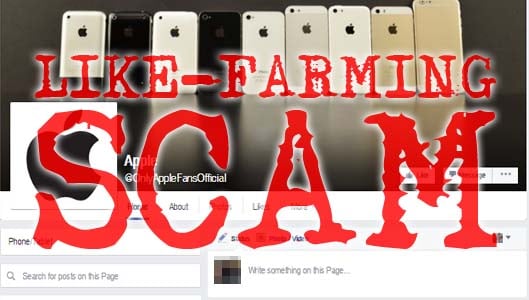This is what a like-farming Facebook page looks like
Like-farming is the process of attempting to lure people into liking a page through deception or exploitation, where followers can then be exposed to all sorts of Internet nasties.
Perhaps most popularly, like-farming Facebook pages use fake giveaways or competitions to lure in followers. We discuss fake giveaway scams in our blog post here.
However, as many a teacher will attest, we often best learn through studying real-life examples. So here is a screenshot of a page we stumbled on this week.
It’s essentially a standard like-farming Facebook page using a flurry of fake competition posts to lure social media users into liking. As you can see, it uses the popular Apple brand as bait. But what are the giveaways here? How do we know this is just a like-farming page?
1. It’s not an official Apple owned Facebook page. The username may be @OnlyAppleFansOfficial, but a username with the word ‘official’ in it does not make it an official page. Official pages owned by brands have the blue verification tick next to the username, as you can see from the image below which is a Facebook page owned by Apple (note that there is no Facebook page for the generic Apple brand, rather separate ones for their specific products.)
2. The page is creating posts that ask you share the post on your timeline, as well as comment and like the post. This is a typical like-farming post. Legitimate pages will not ask you to share links to your timeline since this is against Facebook’s terms of service regarding promotions.
Sponsored Content. Continued below...
3. The page has little history. At the time of writing, the page has made only 12 posts and was created less than 3 days ago. Given that the page is already posting “promotions” designed to lure people into sharing its posts, it is clear that the page is concerned only with luring people into liking the page.
4. All of the posts made by the page requested readers like or share them. This is to help the posts spread across Facebook which in turn lures social media users into following the page. Requesting readers interact with a post can be a sound marketing tactic, but if every post implores this type of interaction, then it is likely to be a like-farming page. The page has posted no useful or helpful information or links to actual articles.
5. There is no contact information on the page. Legitimate Facebook pages will normally include information that allows you to contact the company or people behind the page.
It is important never to follow like-farming pages like this. The people behind these pages are only concerned with making money and they don’t care if they exploit their followers to achieve this. Like-farming pages constantly posts links to spammy marketing webpages that harvest your personal information and can even direct you to rogue Facebook apps, malware-laden websites or identity theft scams.
Continued below...
Thanks for reading, we hope this article helped, but before you leave us for greener pastures, please help us out.
We're hoping to be totally ad-free by 2025 - after all, no one likes online adverts, and all they do is get in the way and slow everything down. But of course we still have fees and costs to pay, so please, please consider becoming a Facebook supporter! It costs only 0.99p (~$1.30) a month (you can stop at any time) and ensures we can still keep posting Cybersecurity themed content to help keep our communities safe and scam-free. You can subscribe here
Remember, we're active on social media - so follow us on Facebook, Bluesky, Instagram and X


